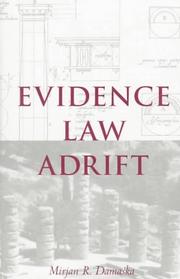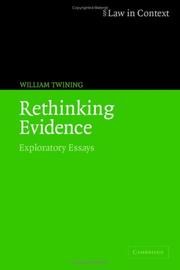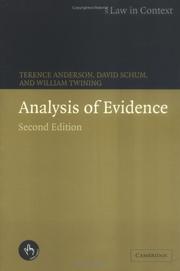| Listing 1 - 10 of 20 | << page >> |
Sort by
|
Book
ISBN: 0748698175 1845861736 9780748698172 9781845861353 1845861353 9781845861735 9781845861735 Year: 2012 Publisher: Dundee
Abstract | Keywords | Export | Availability | Bookmark
 Loading...
Loading...Choose an application
- Reference Manager
- EndNote
- RefWorks (Direct export to RefWorks)
Evidence Essentials, now in its third edition, is an invaluable study guide for students. It provides up-to-date, concise and comprehensive coverage of the law of evidence in Scotland and is the ideal text for students who come new to the subject and for those preparing for exams. This book is also an excellent resource for those who need to refresh or update their knowledge. Summary sections of Essential Facts and Essential Cases will help students to identify, understand and remember the key elements of the subject.
Evidence (Law) --- Extrinsic evidence --- Parol evidence --- Trial evidence --- Actions and defenses --- Judicial process --- Trial practice --- Estoppel
Book
ISBN: 1474412017 9781474412018 9781474411998 1474411991 9781474412001 1474412009 9781474412025 1474412025 Year: 2019 Publisher: Edinburgh : Edinburgh University Press,
Abstract | Keywords | Export | Availability | Bookmark
 Loading...
Loading...Choose an application
- Reference Manager
- EndNote
- RefWorks (Direct export to RefWorks)
Why does Scotland have the evidence laws it does? This is the first textbook to set the Scots law of evidence against a modern backdrop of legal thought and empirical research. It examines the non-legal dimensions of evidence and proof through the lens of legal philosophy, procedure, sociology, science and psychology to analyse the contexts that affect the handling of facts and the process of proof in Scotland. Drawing extensively on socio-legal research, the book provides an accurate picture of how fact-finding works in Scotland – giving students the foundation for a complete, critical and contextual understanding of Scots evidence law.Key FeaturesDetailed, discursive and clearly written: designed for use on LLB evidence law courses in Scotland and by postgraduate students and researchers in the socio-legal contexts of the legal processExamines the philosophical, procedural, sociological, scientific and psychological factors that influence the Scots law of evidenceShows how these factors affect the purported aims of legal fact-finding: to ascertain truth and ensure justice through dealing rationally with evidence and proof
Evidence (Law) --- Extrinsic evidence --- Parol evidence --- Trial evidence --- Actions and defenses --- Judicial process --- Trial practice --- Estoppel

ISBN: 0300146477 0585353026 9780585353029 9780300146479 0300069375 9780300069372 0300069375 Year: 1997 Publisher: New Haven Yale University Press
Abstract | Keywords | Export | Availability | Bookmark
 Loading...
Loading...Choose an application
- Reference Manager
- EndNote
- RefWorks (Direct export to RefWorks)
In this important book, a distinguished legal scholar examines how the legal culture and institutions in Anglo-American countries affect the way in which evidence is gathered, sifted, and presented to the courts. Mirjan Damaska focuses on the significance of the divided tribunal (between judge and jury), the concentrated character of trials ("day-in-court" justice), and the prominent role of the parties in adjudication (the adversary system). Throughout he contrasts the Anglo-American system with Continental, or civil- law justice, where lay fact finders sit with professional judges in unified tribunals, proceedings are episodic rather than concentrated, and the parties have fewer responsibilities than in the common-law tradition.Damaska describes the impact of the traditional institutional environment on the gathering and handling of evidence in common- law jurisdictions and then explores recent transformations of this environment: trial by jury has dramatically declined, pretrial proceedings have greatly proliferated, the adversary system shows signs of weakening in some types of cases. As a result, many rules and practices supporting the treatment of evidentiary material are in danger of becoming extinct. In addition, says Damaska, the increasing use of scientific methods of inquiry could place further strains on the use of traditional common-law evidence. In the future we should expect greater variety in decisionmaking activity, with factual inquiries tailored to the specific type of proceeding and common-law evidence restricted to a narrow sphere
Evidence (Law) --- Law, General & Comparative --- Law, Politics & Government --- Extrinsic evidence --- Parol evidence --- Trial evidence --- Actions and defenses --- Judicial process --- Trial practice --- Estoppel

ISBN: 110715796X 1280956119 0511351623 0511190832 0511648308 0511556519 0511617240 0511191154 0511190190 9780511190193 9780511648304 9780511351624 9780511617249 9780511191152 0521675375 9780521675376 Year: 2006 Publisher: Cambridge ; New York : Cambridge University Press,
Abstract | Keywords | Export | Availability | Bookmark
 Loading...
Loading...Choose an application
- Reference Manager
- EndNote
- RefWorks (Direct export to RefWorks)
The Law of Evidence has traditionally been perceived as a dry, highly technical, and mysterious subject. This book argues that problems of evidence in law are closely related to the handling of evidence in other kinds of practical decision-making and other academic disciplines, that it is closely related to common sense and that it is an interesting, lively and accessible subject. These essays develop a readable, coherent historical and theoretical perspective about problems of proof, evidence, and inferential reasoning in law. Although each essay is self-standing, they are woven together to present a sustained argument for a broad inter-disciplinary approach to evidence in litigation, in which the rules of evidence play a subordinate, though significant, role. This revised and enlarged edition includes a revised introduction, the best-known essays in the first edition, and chapters on narrative and argumentation, teaching evidence, and evidence as a multi-disciplinary subject.
Evidence (Law) --- Extrinsic evidence --- Parol evidence --- Trial evidence --- Actions and defenses --- Judicial process --- Trial practice --- Estoppel --- History. --- Law --- General and Others

ISBN: 052167316X 9780521673167 9780511610585 1107142822 0511351496 0511127782 0511556462 0511610580 1280955988 0511199937 0511127251 9780511127786 9780511351495 9780511127250 9786610955985 6610955980 Year: 2005 Publisher: Cambridge: Cambridge university press,
Abstract | Keywords | Export | Availability | Bookmark
 Loading...
Loading...Choose an application
- Reference Manager
- EndNote
- RefWorks (Direct export to RefWorks)
This extensively revised second edition is a rigorous introduction to the construction and criticism of arguments about questions of fact, and to the marshalling and evaluation of evidence at all stages of litigation. It covers the principles underlying the logic of proof; the uses and dangers of story-telling; standards for decision and the relationship between probabilities and proof; the chart method and other methods of analyzing and ordering evidence in fact-investigation, in preparing for trial, and in connection with other important decisions in legal processes and in criminal investigation and intelligence analysis. Most of the chapters in this new edition have been rewritten; the treatment of fact investigation, probabilities and narrative has been extended; and new examples and exercises have been added. Designed as a flexible tool for undergraduate and postgraduate courses on evidence and proof, students, practitioners and teachers alike will find this book challenging but rewarding.
Evidence (Law) --- Study and teaching --- Law --- General and Others --- Evidence (Law) - United States. --- Evidence (Law) - Study and teaching - United States. --- Extrinsic evidence --- Parol evidence --- Trial evidence --- Actions and defenses --- Judicial process --- Trial practice --- Estoppel
Book
ISBN: 0128093668 0128093358 9780128093665 9780128093351 Year: 2016 Publisher: Amsterdam : Elsevier,
Abstract | Keywords | Export | Availability | Bookmark
 Loading...
Loading...Choose an application
- Reference Manager
- EndNote
- RefWorks (Direct export to RefWorks)
Electronic records --- Technology and law. --- Evidence (Law) --- Electronic evidence. --- Law and legislation. --- Digital evidence --- Evidence, Documentary --- Extrinsic evidence --- Parol evidence --- Trial evidence --- Actions and defenses --- Judicial process --- Trial practice --- Estoppel --- Law and technology --- Law
Book

ISBN: 2821885636 2853996611 Year: 2017 Publisher: Aix-en-Provence : Presses universitaires de Provence,
Abstract | Keywords | Export | Availability | Bookmark
 Loading...
Loading...Choose an application
- Reference Manager
- EndNote
- RefWorks (Direct export to RefWorks)
L'importance que revêtent l'aveu et le témoignage dans le droit et les sociétés médiévale et moderne s'explique par la volonté des juges de trouver la preuve, élément essentiel pour prononcer la sentence attendue par les victimes, les prévenus, le corps social : du point de vue étymologique, « prouver » signifie mettre à l'épreuve, établir la vérité au nom de la justice et de l'équité. Dans le cadre des enquêtes, dont l'usage se développe à partir de la seconde moitié du XIIIe siècle pour toutes sortes d'objets (judiciaire, administratif, fiscal, foncier), la parole des témoins prend la forme et le nom d'une confession, et l'enquête se donne pour objet d'atteindre, par ce biais, la « vérité ». L'intérêt prêté à cette forme du discours par les historiens du droit et des institutions rend compte d'une forte inclination à saisir les usages du droit savant, la procédure et les preuves légales au sein des villes et des anciens États.
Evidence (Law) --- Burden of proof --- Law, Medieval --- History --- Onus probandi --- Proof, Burden of --- Trial practice --- Presumption of innocence --- Extrinsic evidence --- Parol evidence --- Trial evidence --- Actions and defenses --- Judicial process --- Estoppel --- Law and legislation --- preuve --- période moderne --- droit --- Moyen-âge --- aveux
Book
ISBN: 0429228546 1134994605 1280334533 9786610334537 0203332679 0203017323 9780203332672 1134994591 Year: 2002 Publisher: New York E. Horwood
Abstract | Keywords | Export | Availability | Bookmark
 Loading...
Loading...Choose an application
- Reference Manager
- EndNote
- RefWorks (Direct export to RefWorks)
Describes ways of assessing forensic science evidence and the means of communicating the assessment to a court of law. The aim of this work is to ensure that the courts consider seriously the probability of the evidence of association.
Forensic sciences --- Forensic statistics. --- Evidence (Law) --- Extrinsic evidence --- Parol evidence --- Trial evidence --- Actions and defenses --- Judicial process --- Trial practice --- Estoppel --- Statistics --- Criminalistics --- Forensic science --- Science --- Criminal investigation --- Statistical methods.
Book
ISBN: 1280569573 9786613599179 9004219994 9789004219991 9781280569579 6613599174 900421996X 9789004219960 Year: 2012 Publisher: Leiden BRILL
Abstract | Keywords | Export | Availability | Bookmark
 Loading...
Loading...Choose an application
- Reference Manager
- EndNote
- RefWorks (Direct export to RefWorks)
Evidentiary assessment holds a central position in all forms of judicial decision-making. Also the asylum procedure is dependent on solutions made in theory and practice regarding evidentiary issues. This book explores the particular framework of evidentiary assessment in selected European appellate asylum procedures and discusses the relationship between these procedures, on the one hand, and between these procedures and other legal systems, including the EU legal order, on the other. Conclusions are made regarding the similarities and differences between the German, English and Finnish asylum procedures and the position and impact of European legal norms on the national procedures. The book further discusses possibilities for harmonization and the future work towards a Common European Asylum System.
Asylum, Right of --- Emigration and immigration law --- Appellate procedure --- Evidence (Law) --- LAW / Constitutional --- LAW / Public --- Extrinsic evidence --- Parol evidence --- Trial evidence --- Actions and defenses --- Judicial process --- Trial practice --- Estoppel --- Appeal --- Appellate courts --- Civil procedure --- Courts --- Criminal procedure --- Procedure (Law)
Periodical
Abstract | Keywords | Export | Availability | Bookmark
 Loading...
Loading...Choose an application
- Reference Manager
- EndNote
- RefWorks (Direct export to RefWorks)
Evidence (Law) --- Burden of proof --- Preuve (Droit) --- Fardeau de la preuve --- Burden of proof. --- Law. --- Extrinsic evidence --- Parol evidence --- Trial evidence --- Onus probandi --- Proof, Burden of --- Law and legislation --- Actions and defenses --- Judicial process --- Trial practice --- Estoppel --- Presumption of innocence --- Prova (Dret) --- Evidència (Dret) --- Testimoniatge (Prova) --- Accions i defenses (Dret) --- Interrogatori de testimonis --- Pràctica forense --- Pràctica processal --- Procediment judicial --- Psicologia forense --- Testimonis
| Listing 1 - 10 of 20 | << page >> |
Sort by
|

 Search
Search Feedback
Feedback About UniCat
About UniCat  Help
Help News
News